Nurses Narratives Miss Margaret Kate Brown
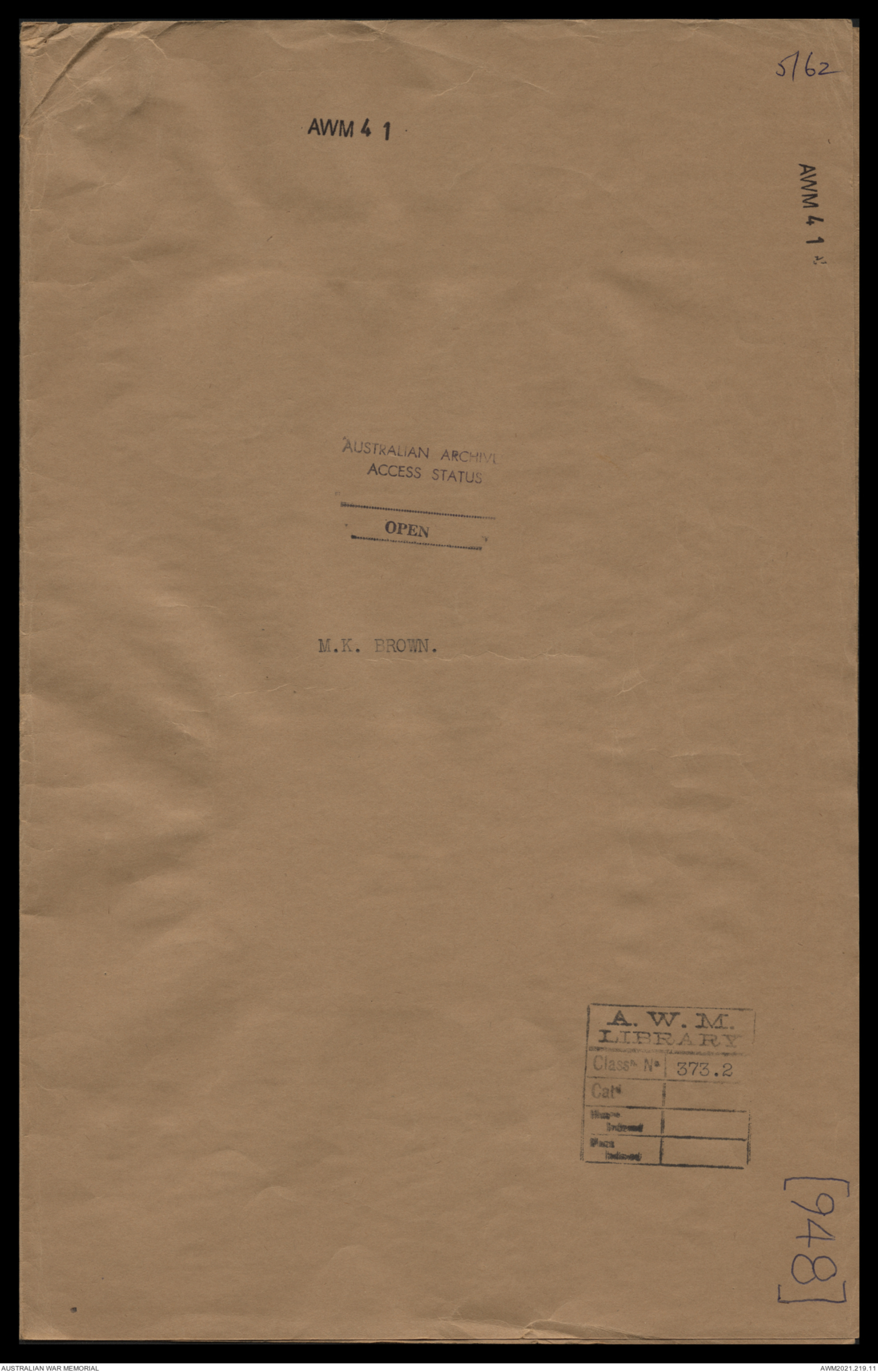
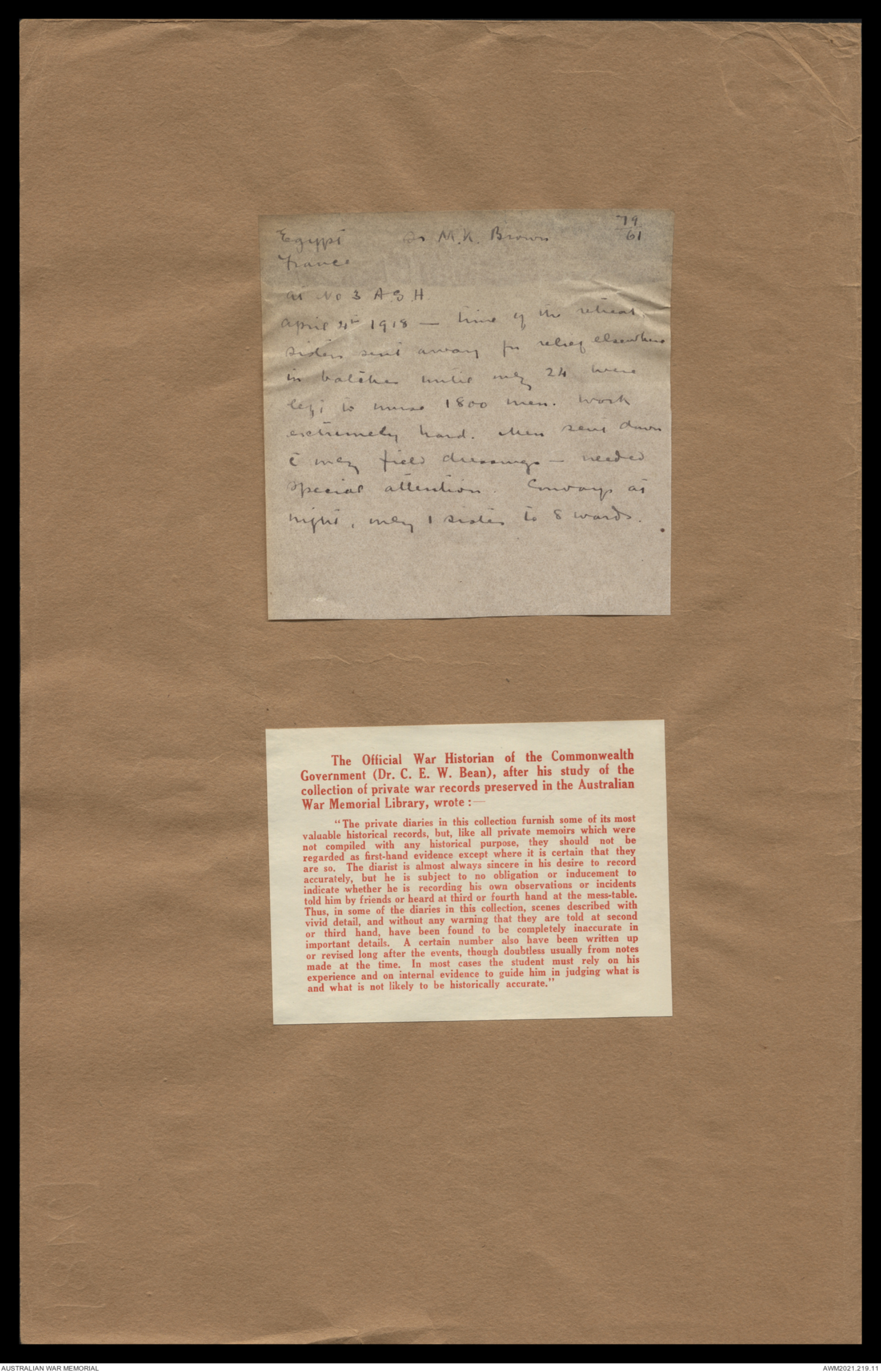
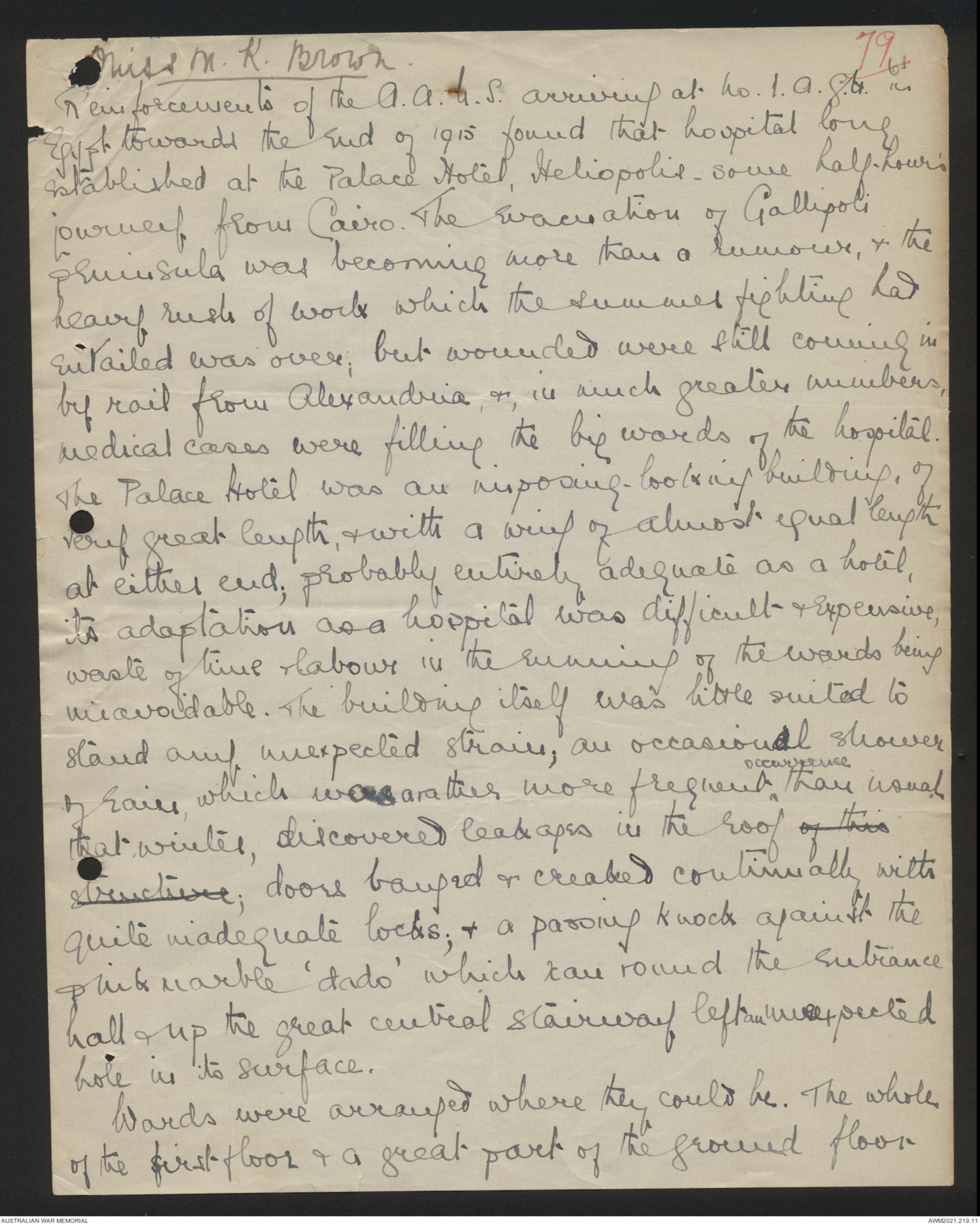
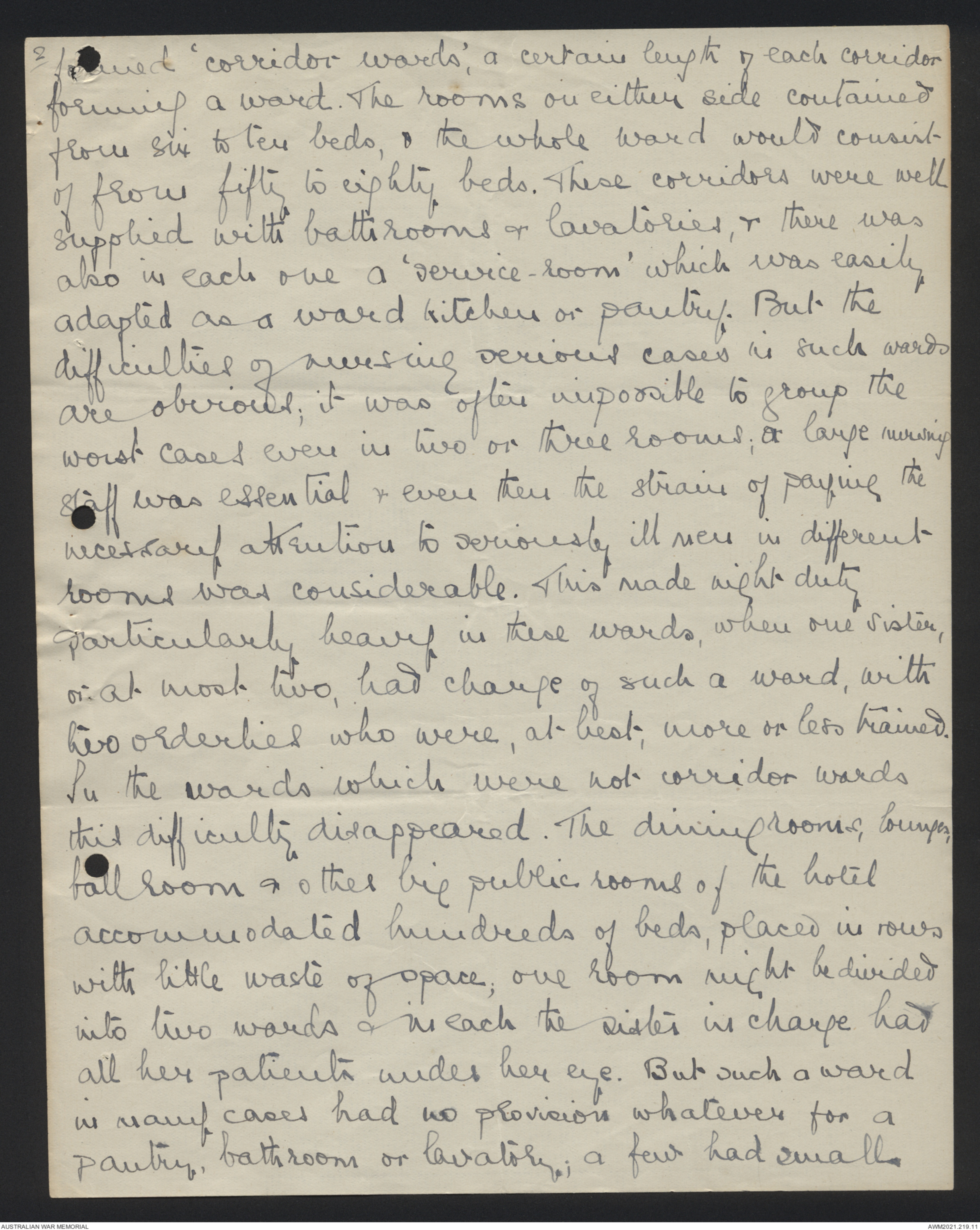
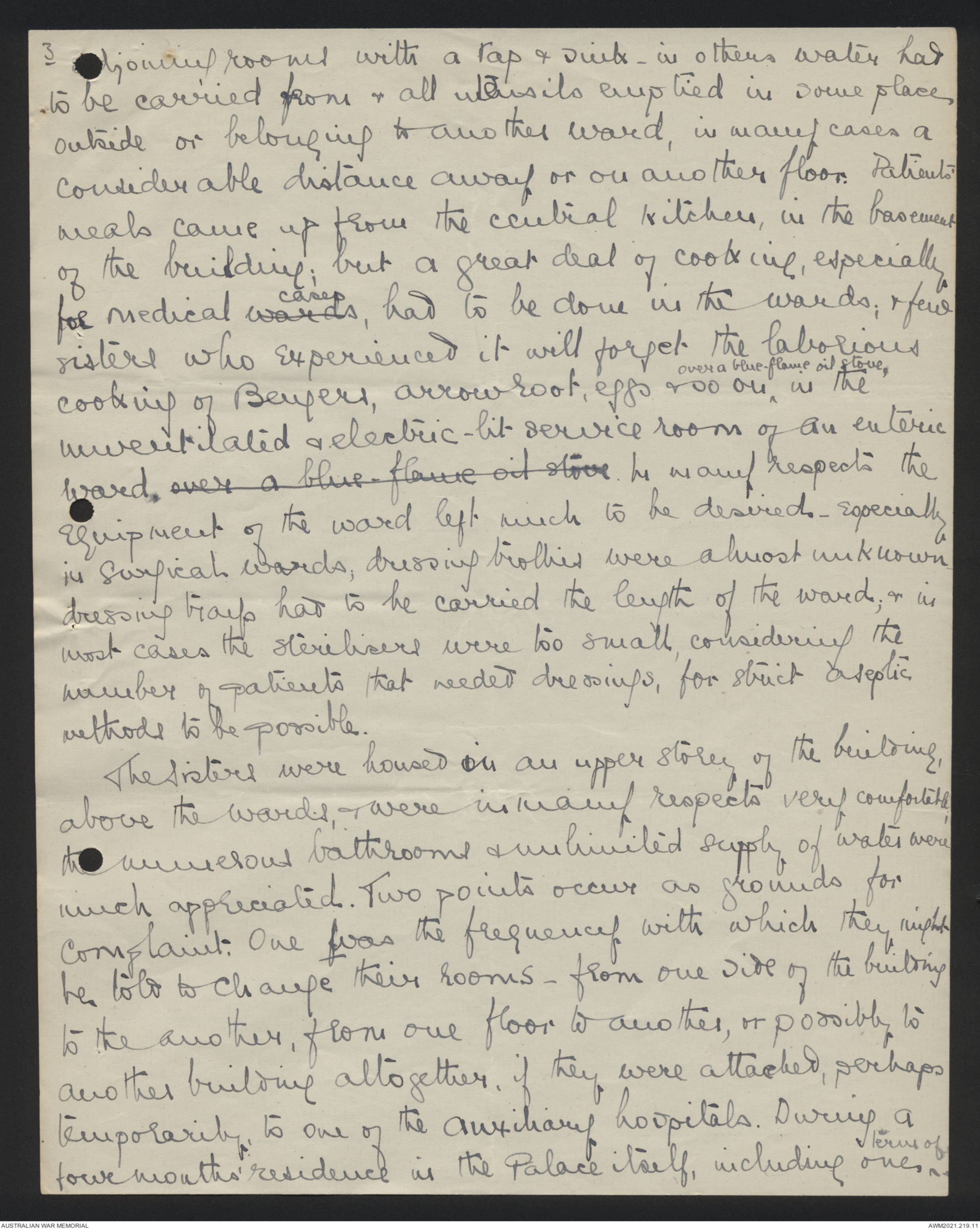
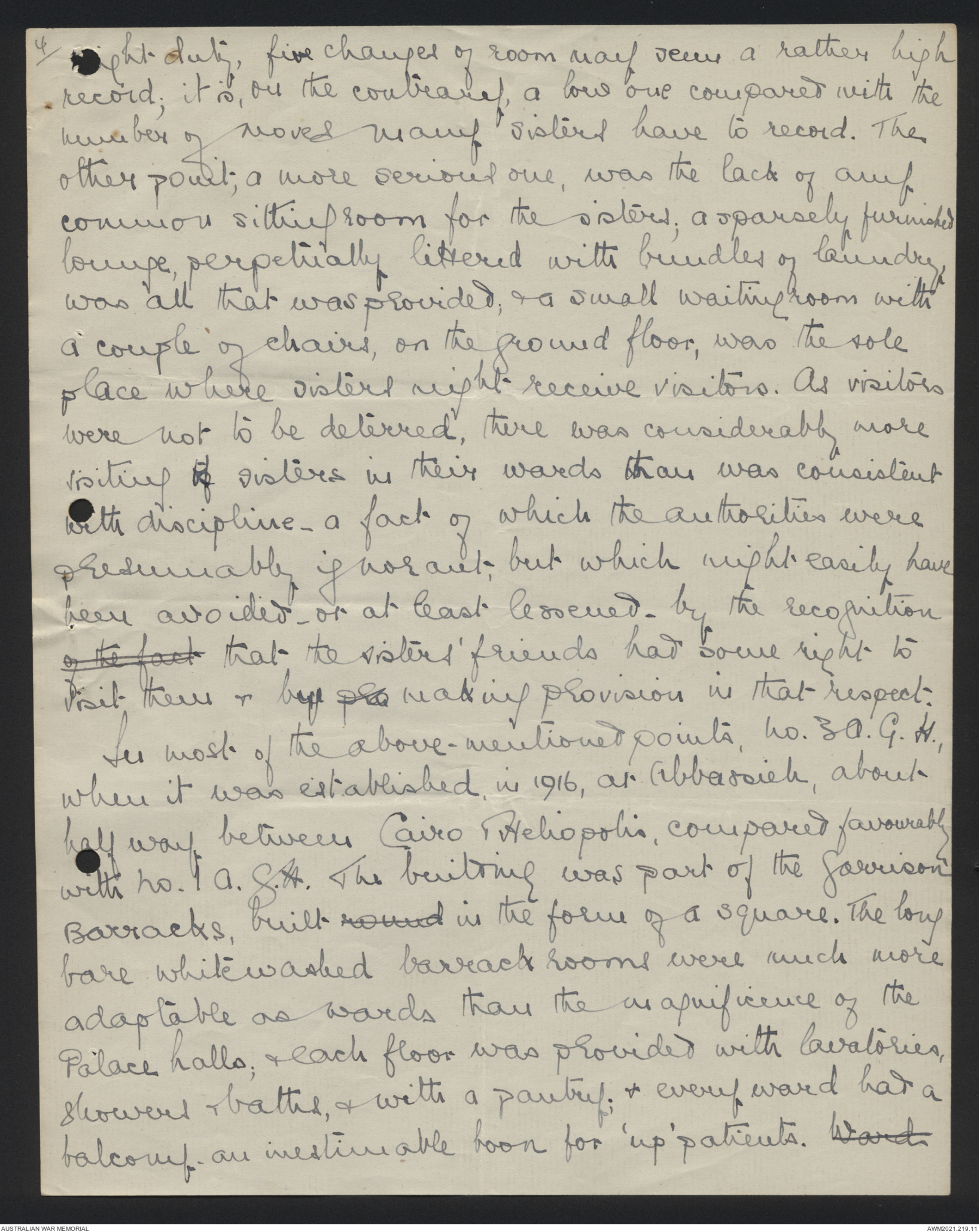
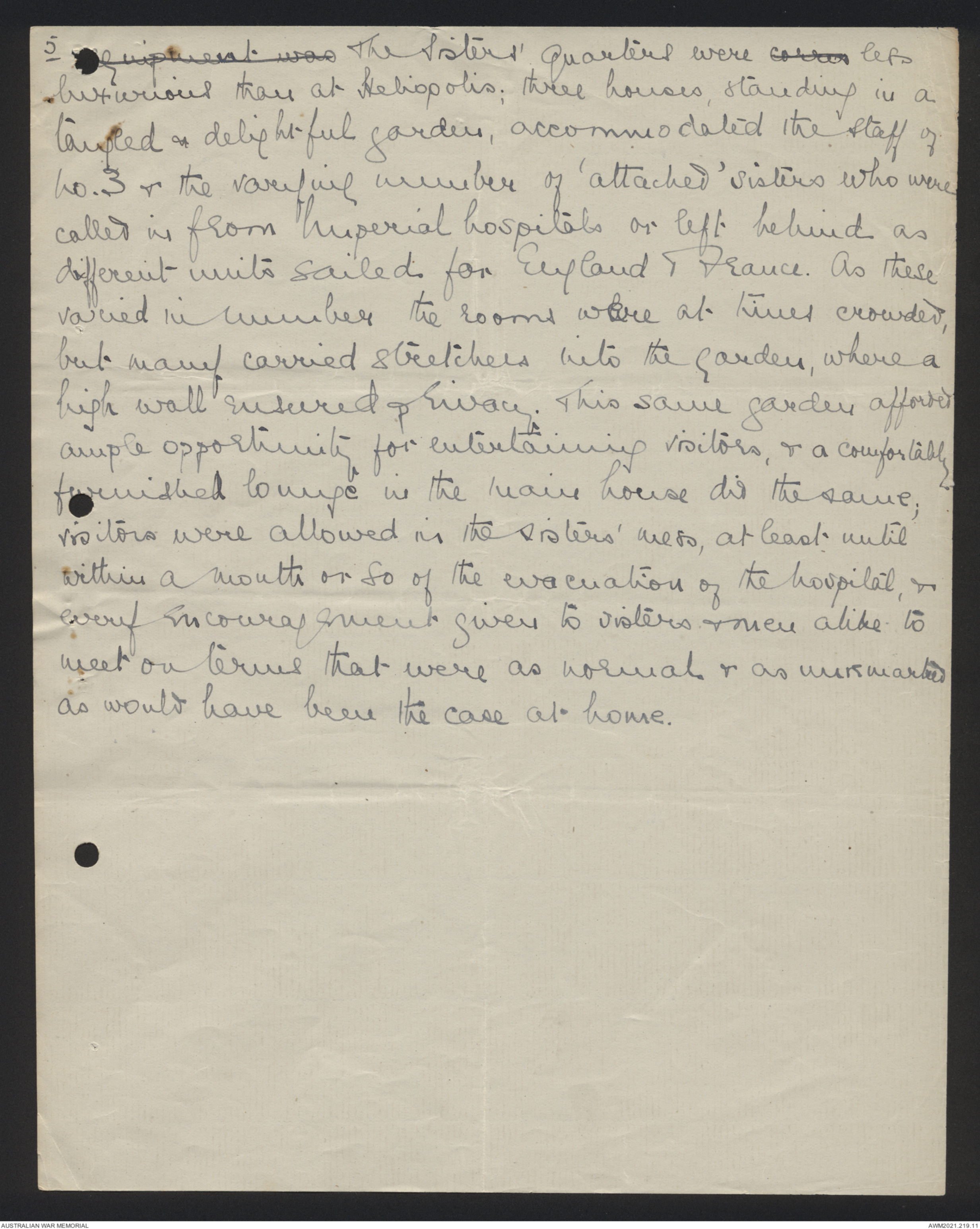
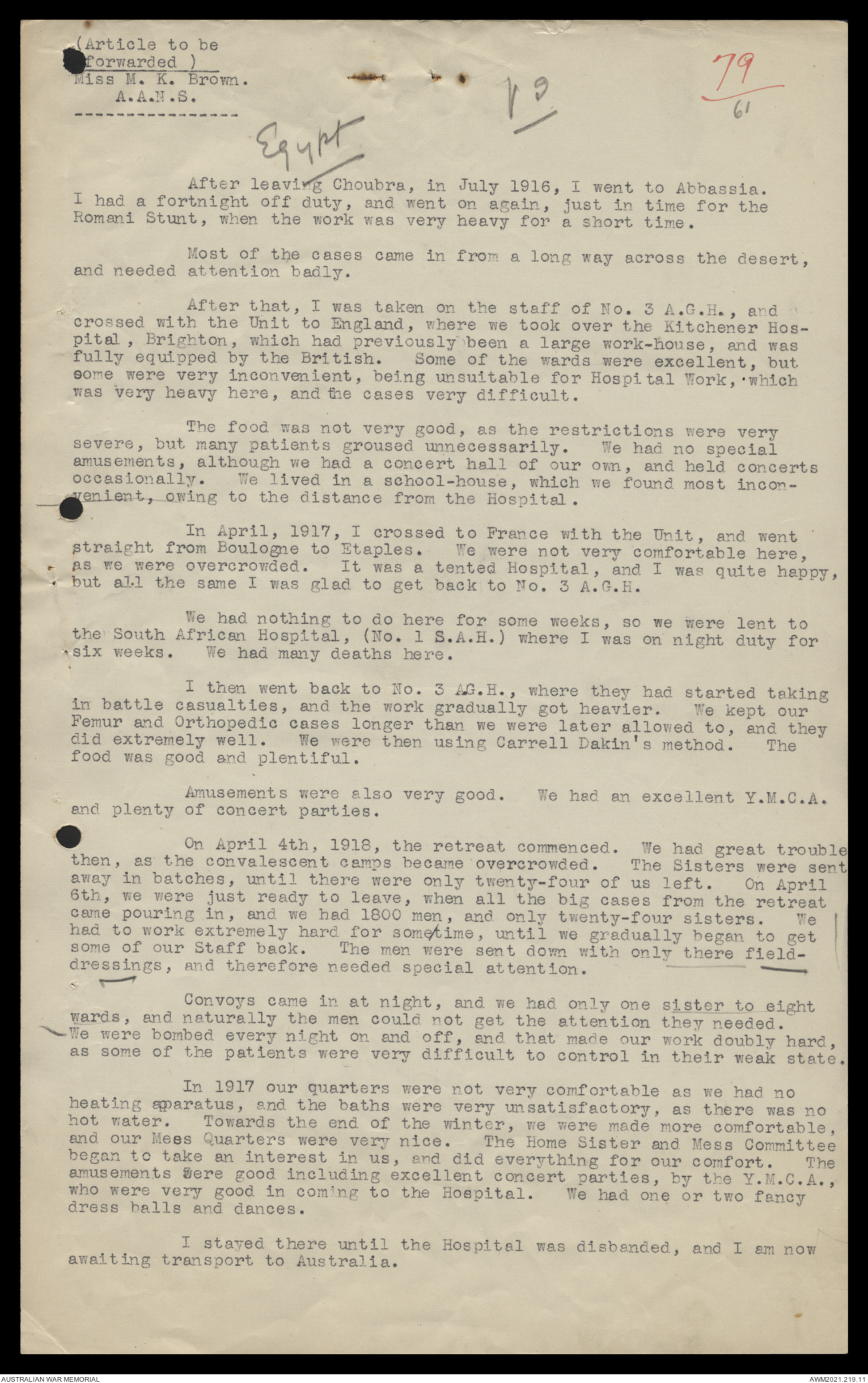
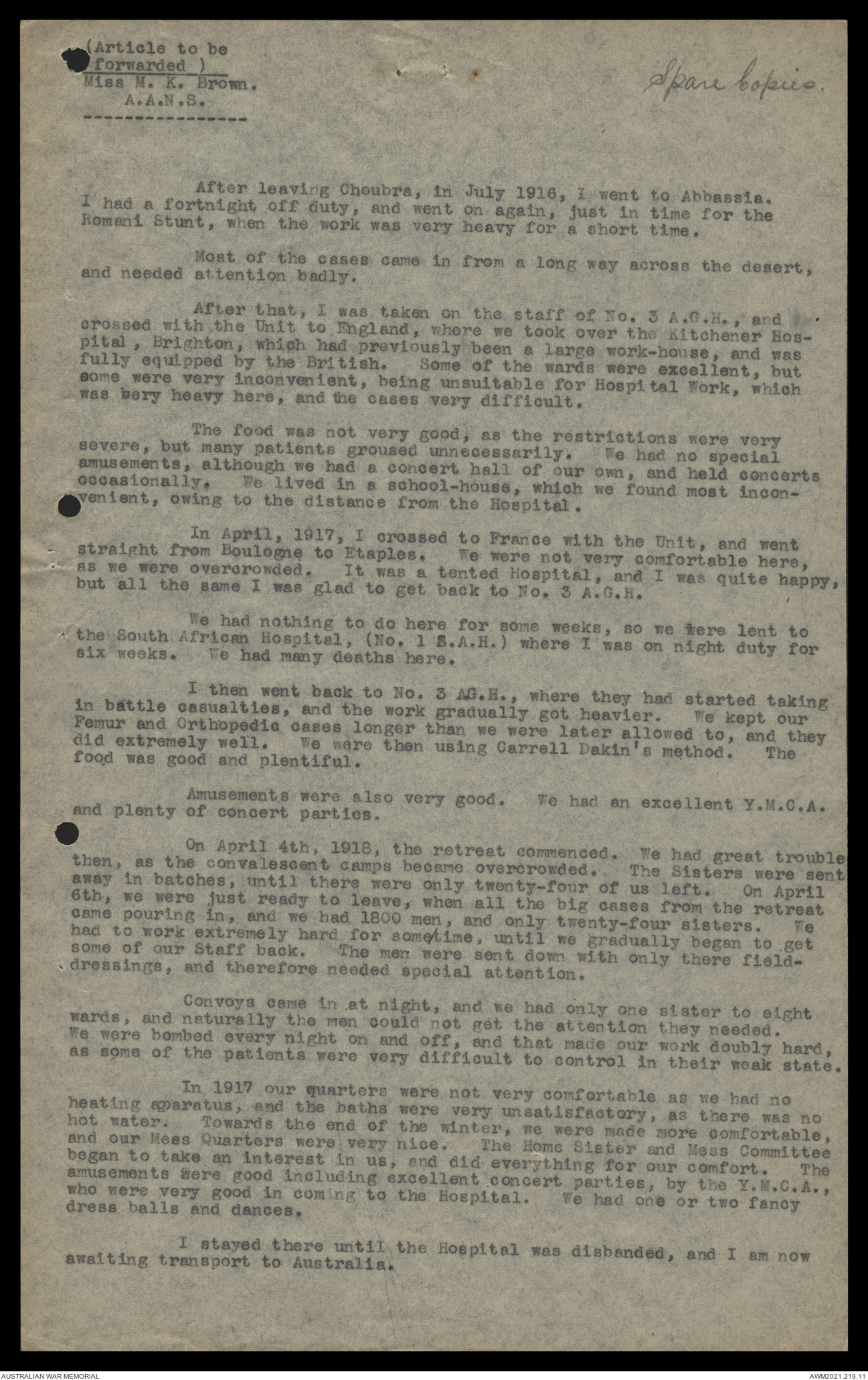
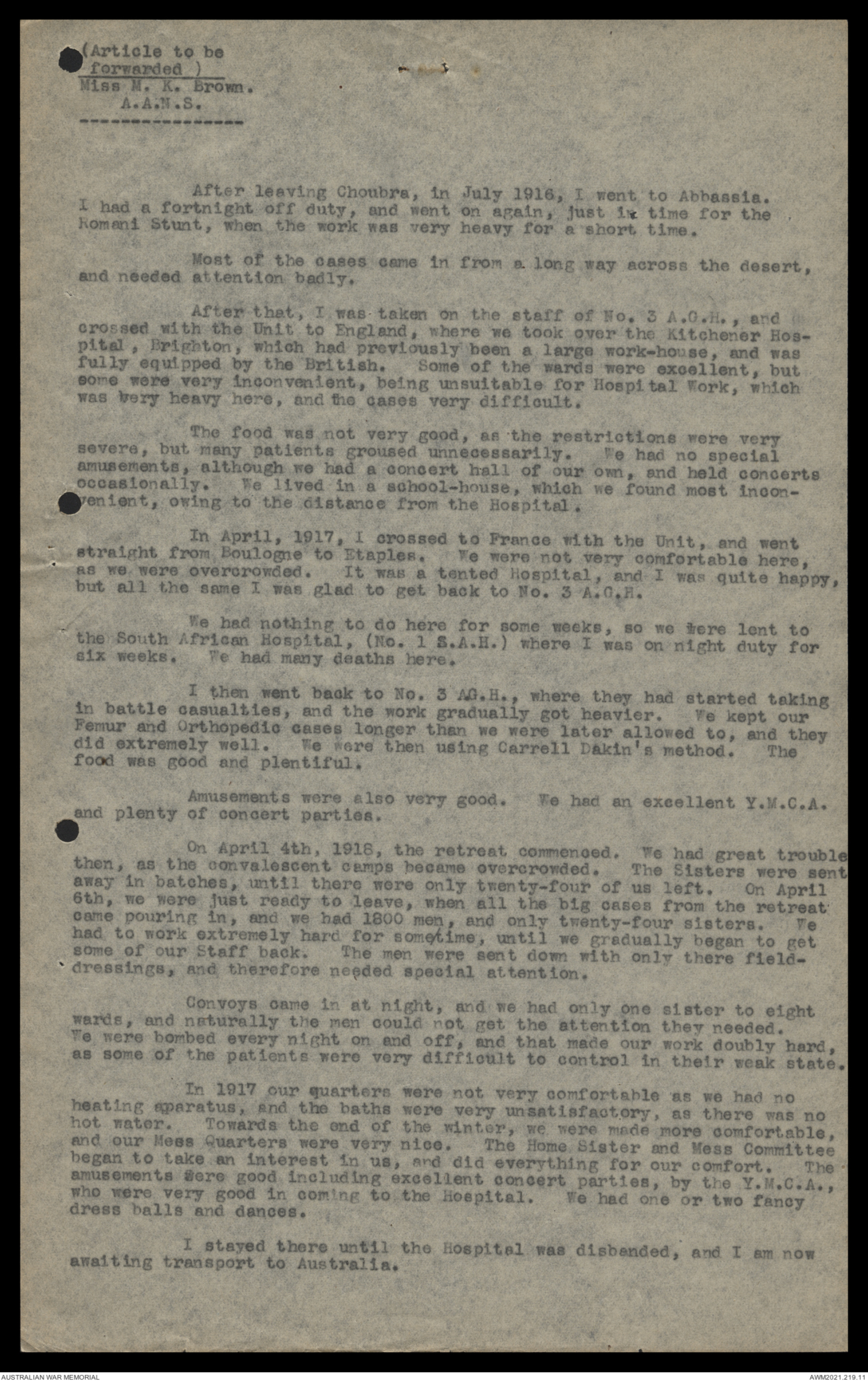
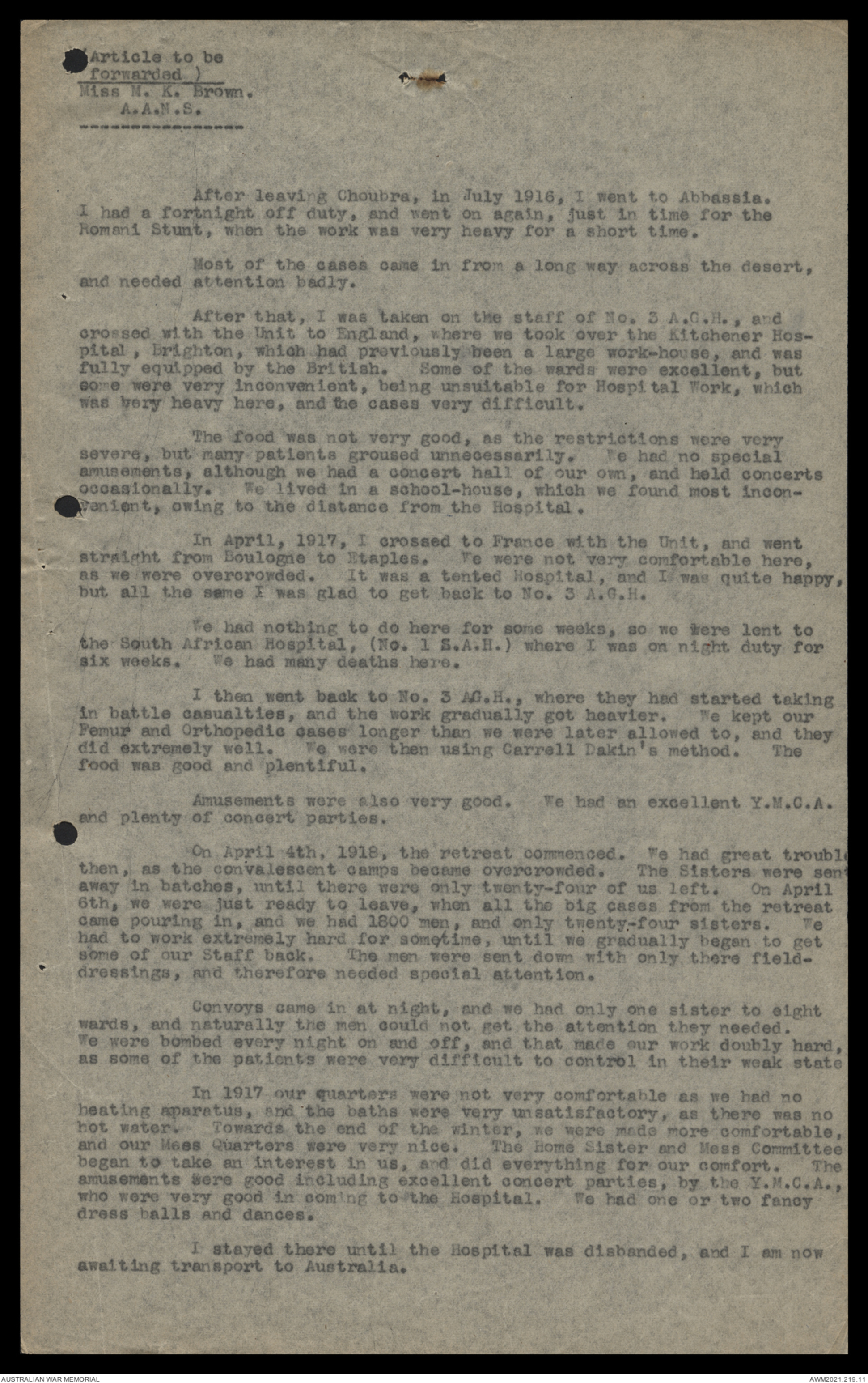
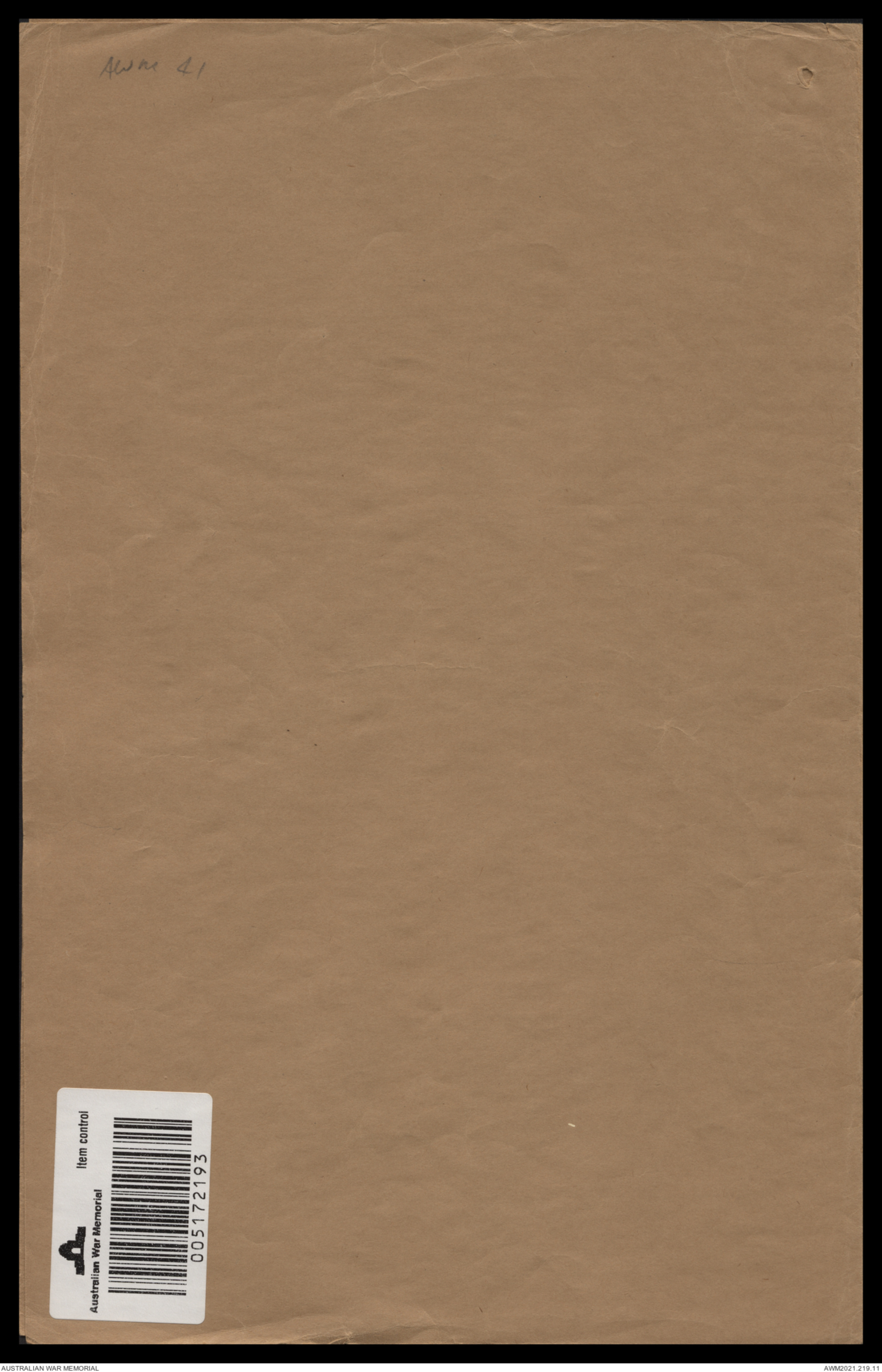
AWM 41 5/62
AUSTRALIAN ARCHIVE
ACCESS STATUS
OPEN
M.K. BROWN.
[948]
Egypt Dr M.K. Brown 79/61
France
ai No 3 A.G.H.
April 4th 1918 - time of the retreat
sisters sent away for relief elsewhere
in batches until only 24 were
left to nurse 1800 men. Work
extremely hard. Men sent down
č only field dressings - needed
special attention. Convoys at
night, only 1 sister to 8 wards.
The Official War Historian of the Commonwealth
Government (Dr C. E. W. Bean), after his study of the
collection of private war records preserved in the Australian
War Memorial Library, wrote:-
"The private diaries in this collection furnish some of its most
valuable historical records, but, like all private memoirs which were
not compiled with any historical purpose, they should not be
regarded as first-hand evidence except where it is certain that they
are so. The diarist is almost always sincere in his desire to record
accurately, but he is subject to no obligation or inducement to
indicate whether he is recording his own observations or incidents
told him by friends or heard at third or fourth hand at the mess-table.
Thus, in some of the diaries in this collection, scenes described
with vivid detail, and without any warning that they are told at second
or third hand, have been found to be completely inaccurate in
important details. A certain number also have been written up
or revised long after the events, though doubtless usually from notes
made at the time. In most cases the student must rely on his
experience and on internal evidence to guide him in judging what is
and what is not likely to be historically accurate."
Miss M.K. Brown. 79
Reinforcements of the A.A.R.S. arriving at No. I A.S.H. in
Egypt towards the end of 1915 found that hospital long
established at the Palace Hotel, Heliopolis-some half-hour's
journey from Cairo. The evacuation of Gallipoli
peninsula was becoming more than a rumour, & the
heavy rush of work which the summer fighting had
entailed was over; but wounded were still coming in
by rail from Alexandria, &, in much greater numbers,
medical cases were filling the big wards of the hospital.
The Palace Hotel was an imposing- looking building, of
very great length, & with a wing of almost equal length
at either end; probably entirely adequate as a hotel,
its adaptation as a hospital was difficult & expensive,
waste of time & labour in the running of the wards being
unavoidable. The building itself was little suited to
stand any unexpected strain; an occasional shower
of rain, which was a rather more frequent occurrence than usual
that winter, discovered leakages in the roof of thisstructure; doors banged & creaked continually with
quite inadequate locks; & a passing knock against the
pink marble 'dado' which ran round the entrance
hall & up the great central stairway left an unexpected
hole in its surface.
Wards were arranged where they could be. The whole
of the first floor & a great part of the ground floor
2/ formed 'corridor wards', a certain length of each corridor
forming a ward. The rooms on either side contained
from six to ten beds, & the whole ward would consist
of from fifty to eighty beds. These corridors were well
supplied with bathrooms & lavatories, & there was
also in each one a 'service-room' which was easily
adapted as a ward kitchen or pantry. But the
difficulties of nursing serious cases in such wards
are obvious; it was often impossible to group the
worst cases even in two or three rooms; a large nursing
staff was essential & even then the strain of paying the
necessary attention to seriously ill men in different
rooms was considerable. This made night duty
particularly heavy in these wards, when one sister,
or at most two, had charge of such a ward, with
two orderlies who were, at best, more or less trained.
In the wards which were not corridor wards
this difficulty disappeared. The dining rooms, lounges
ballroom & other big public rooms of the hotel
accommodated hundreds of beds, placed in rows
with little waste of space, one room might be divided
into two wards & in each the sister in charge had
all her patients under her eye. But such a ward
in many cases had no provision whatever for a
pantry, bathroom or lavatory; a few had small
3/ adjoining rooms with a tap + sink - in others water had
to be carried from & all utensils emptied in some place,
outside or belonging to another ward, in many cases a
considerable distance away or on another floor. Patients'
meals came up from the central kitchens, in the basement
of the building; but a great deal of cooking, especially
for medical ward cases, had to be done in the wards; & few
sisters who experienced it will forget the laborious
cooking of Bayers, arrowroot, eggs and so on, over a blue flame oil stove, in the
unventilated & electric-lit service room of an enteric
ward over a blue-flame oil stove . In many respects the
equipment of the ward left much to be desired- especially
in surgical wards, dressing trollies were almost unknown
dressing trays had to be carried the length of the ward, & in
most cases the sterilisers were too small, considering the
number a patients that needed dressings, for strict aseptic
methods to be possible.
The Sisters were housed in an upper storey of the building
above the wards, & were in many respects very comfortable
the numerous bathrooms & unlimited supply of water were
much appreciated. Two points occur as grounds for
complaint. One was the frequency with which they might
be told to change their rooms - from one side of the building
to the another, from one floor to another, or possibly to
another building altogether, if they were attached, perhaps
temporarily to one of the auxiliary hospitals. During a
four months residence in the Palace itself, including ones terms of
4./ night duty, five changes of room may seem a rather high
record; it is, on the contrary, a low one compared with the
number of moves many sisters have to record. The
other point; a more serious one, was the lack of any
common sitting room for the sisters; a sparsely furnished
lounge, perpetually littered with bundles of laundry
was all that was provided, & a small waiting room with
a couple of chairs, on the ground floor, was the sole
place where sisters might receive visitors. As visitors
were not to be deterred, there was considerably more
visiting of sisters in their wards than was consistent
with discipline - a fact of which the authorities were
presumably ignorant; but which might easily have
been avoided or at least lessened- by the recognitionof the fact that the sisters' friends had some right to
visit them & by so making provision in that respect.
So most of the above-mentioned points no. 3 A.G.H.
when it was established, in 1916, at Abbassieh, about
half way between Cairo & Heliopolis, compared favourably
with No. I A.G.H. The building was part of the Garrison
Barracks, built round in the form of a square. The long
bare whitewashed barrack rooms were much more
adaptable as wards than the magnificence of the
Palace halls & each floor was provided with lavatories
showers & baths, & with a pantry; & every ward had a
balcony an inestimable boon for 'up' patients. Ward
5. equipment was The Sisters' quarters were [[corres?]] less
luxurious than at Heliopolis; three houses, standing in a
tangled & delightful garden, accommodated the staff of
no. 3 & the varying number of ‘attached’ sisters who were
called in from Imperial hospitals or left behind as
different units sailed for England & France. As these
varied in number the rooms were at times crowded
but many carried stretchers into the garden, where a
high wall ensured privacy. This same garden afforded
ample opportunity for entertaining visitors, & a comfortably
furnished lounge in the main house did the same;
visitors were allowed in the sisters mess, at least until
within a month or so of the evacuation of the hospital, &
every encouragement given to visitors & men alike to
meet on terms that were as normal & as awkward
as would have been the case at home.
(Article to be
forwarded)
Miss M. K. Brown.
A.A.N.S.
[*Egypt*] [*vs?*] [*79/61*]
After leaving Choubra, in July 1916, I went to Abbassia.
I had a fortnight off duty, and went on again, just in time for the
Romani Stunt, when the work was very heavy for a short time.
Most of the cases came in from a long way across the desert,
and needed attention badly.
After that, I was taken on the staff of No. 3 A.G.H., and
crossed with the Unit to England, where we took over the Kitchener Hospital,
Brighton, which had previously been a large work-house, and was
fully equipped by the British. Some of the wards were excellent, but
some were very inconvenient, being unsuitable for Hospital Work, which
was very heavy here, and the cases very difficult.
The food was not very good, as the restrictions were very
severe, but many patients groused unnecessarily. We had no special
amusements, although we had a concert hall of our own, and held concerts
occasionally. We lived in a school-house, which was found most inconvenient,
owing to the distance from the Hospital.
In April, 1917, I crossed to France with the Unit, and went
straight from Boulogne to Etaples. We were not very comfortable here,
as we were overcrowded. It was a tented Hospital, and I was quite happy,
but all the same I was glad to get back to No. 3 A.G.H.
We had nothing to do here for some weeks, so we were lent to
the South African Hospital, (No. 1 S.A.H.) where I was on night duty for
six weeks. We had many deaths here.
I then went back to No. 3 A.G.H., where they had started taking
in battle casualties, and the work gradually got heavier. We kept our
Femur and Orthopedic cases longer than we were later allowed to, and they
did extremely well. We were then using Carrell Dakin's method. The
food was good and plentiful.
Amusements were also very good. We had an excellent Y.M.C.A.
and plenty of concert parties.
On April 4th, 1918, the retreat commenced. We had great trouble
then, as the convalescent camps became overcrowded. The Sisters were sent
away in batches, until there were only twenty-four of us left. On April
6th, we were just ready to leave, when all the big cases from the retreat
came pouring in, and we had 1800 men, and only twenty-four sisters. We
had to work extremely hard for some time, until we gradually began to get
some of our Staff back. The men were sent down with only there field-
dressings, and therefore needed special attention.
Convoys came in at night, and we had only one sister to eight
wards, and naturally the men could not get the attention they needed.
We were bombed every night on and off, and that made our work doubly hard,
as some of the patients were very difficult to control in their weak state.
In 1917 our quarters were not very comfortable as we had no
heating apparatus, and the baths were very unsatisfactory, as there was no
hot water. Towards the end of the winter, we were made more comfortable
and our Mess Quarters were very nice. The Home Sister and Mess Committee
began to take an interest in us, and did everything for our comfort. The
amusements were good including excellent concert parties, by the Y.M.C.A.,
who were very good in coming to the Hospital. We had one or two fancy
dress balls and dances.
I stayed there until the Hospital was disbanded, and I am now
awaiting transport to Australia.
*Spare Copies*
(Article to be
forwarded)
Miss M. K. Brown.
A.A.N.S.
After leaving Choubra, in July 1916, I went to Abbassia.
I had a fortnight off duty, and went on again, just in time for the
Romani Stunt, when the work was very heavy for a short time.
Most of the cases came in from a long way across the desert,
and needed attention badly.
After that, I was taken on the staff of No. 3 A.G.H., and
crossed with the Unit to England, where we took over the Kitchener Hospital,
Brighton, which had previously been a large work-house, and was
fully equipped by the British. Some of the wards were excellent, but
some were very inconvenient, being unsuitable for Hospital Work, which
was very heavy here, and the cases very difficult.
The food was not very good, as the restrictions were very
severe, but many patients groused unnecessarily. We had no special
amusements, although we had a concert hall of our own, and held concerts
occasionally. We lived in a school-house, which was found most inconvenient,
owing to the distance from the Hospital.
In April, 1917, I crossed to France with the Unit, and went
straight from Boulogne to Etaples. We were not very comfortable here,
as we were overcrowded. It was a tented Hospital, and I was quite happy,
but all the same I was glad to get back to No. 3 A.G.H.
We had nothing to do here for some weeks, so we were lent to
the South African Hospital, (No. 1 S.A.H.) where I was on night duty for
six weeks. We had many deaths here.
I then went back to No. 3 A.G.H., where they had started taking
in battle casualties, and the work gradually got heavier. We kept our
Femur and Orthopedic cases longer than we were later allowed to, and they
did extremely well. We were then using Carrell Dakin's method. The
food was good and plentiful.
Amusements were also very good. We had an excellent Y.M.C.A.
and plenty of concert parties.
On April 4th, 1918, the retreat commenced. We had great trouble
then, as the convalescent camps became overcrowded. The Sisters were sent
away in batches, until there were only twenty-four of us left. On April
6th, we were just ready to leave, when all the big cases from the retreat
came pouring in, and we had 1800 men, and only twenty-four sisters. We
had to work extremely hard for some time, until we gradually began to get
some of our Staff back. The men were sent down with only there field-
dressings, and therefore needed special attention.
Convoys came in at night, and we had only one sister to eight
wards, and naturally the men could not get the attention they needed.
We were bombed every night on and off, and that made our work doubly hard,
as some of the patients were very difficult to control in their weak state.
In 1917 our quarters were not very comfortable as we had no
heating apparatus, and the baths were very unsatisfactory, as there was no
hot water. Towards the end of the winter, we were made more comfortable
and our Mess Quarters were very nice. The Home Sister and Mess Committee
began to take an interest in us, and did everything for our comfort. The
amusements were good including excellent concert parties, by the Y.M.C.A.,
who were very good in coming to the Hospital. We had one or two fancy
dress balls and dances.
I stayed there until the Hospital was disbanded, and I am now
awaiting transport to Australia.
(Article to be
forwarded)
Miss M. K. Brown.
A.A.N.S.
After leaving Choubra, in July 1916, I went to Abbassia.
I had a fortnight off duty, and went on again, just in time for the
Romani Stunt, when the work was very heavy for a short time.
Most of the cases came in from a long way across the desert,
and needed attention badly.
After that, I was taken on the staff of No. 3 A.G.H., and
crossed with the Unit to England, where we took over the Kitchener Hospital,
Brighton, which had previously been a large work-house, and was
fully equipped by the British. Some of the wards were excellent, but
some were very inconvenient, being unsuitable for Hospital Work, which
was very heavy here, and the cases very difficult.
The food was not very good, as the restrictions were very
severe, but many patients groused unnecessarily. We had no special
amusements, although we had a concert hall of our own, and held concerts
occasionally. We lived in a school-house, which was found most inconvenient,
owing to the distance from the Hospital.
In April, 1917, I crossed to France with the Unit, and went
straight from Boulogne to Etaples. We were not very comfortable here,
as we were overcrowded. It was a tented Hospital, and I was quite happy,
but all the same I was glad to get back to No. 3 A.G.H.
We had nothing to do here for some weeks, so we were lent to
the South African Hospital, (No. 1 S.A.H.) where I was on night duty for
six weeks. We had many deaths here.
I then went back to No. 3 A.G.H., where they had started taking
in battle casualties, and the work gradually got heavier. We kept our
Femur and Orthopedic cases longer than we were later allowed to, and they
did extremely well. We were then using Carrell Dakin's method. The
food was good and plentiful.
Amusements were also very good. We had an excellent Y.M.C.A.
and plenty of concert parties.
On April 4th, 1918, the retreat commenced. We had great trouble
then, as the convalescent camps became overcrowded. The Sisters were sent
away in batches, until there were only twenty-four of us left. On April
6th, we were just ready to leave, when all the big cases from the retreat
came pouring in, and we had 1800 men, and only twenty-four sisters. We
had to work extremely hard for some time, until we gradually began to get
some of our Staff back. The men were sent down with only there field-
dressings, and therefore needed special attention.
Convoys came in at night, and we had only one sister to eight
wards, and naturally the men could not get the attention they needed.
We were bombed every night on and off, and that made our work doubly hard,
as some of the patients were very difficult to control in their weak state.
In 1917 our quarters were not very comfortable as we had no
heating apparatus, and the baths were very unsatisfactory, as there was no
hot water. Towards the end of the winter, we were made more comfortable
and our Mess Quarters were very nice. The Home Sister and Mess Committee
began to take an interest in us, and did everything for our comfort. The
amusements were good including excellent concert parties, by the Y.M.C.A.,
who were very good in coming to the Hospital. We had one or two fancy
dress balls and dances.
I stayed there until the Hospital was disbanded, and I am now
awaiting transport to Australia.
(Article to be
forwarded)
Miss M. K. Brown.
A.A.N.S.
After leaving Choubra, in July 1916, I went to Abbassia.
I had a fortnight off duty, and went on again, just in time for the
Romani Stunt, when the work was very heavy for a short time.
Most of the cases came in from a long way across the desert,
and needed attention badly.
After that, I was taken on the staff of No. 3 A.G.H., and
crossed with the Unit to England, where we took over the Kitchener Hospital,
Brighton, which had previously been a large work-house, and was
fully equipped by the British. Some of the wards were excellent, but
some were very inconvenient, being unsuitable for Hospital Work, which
was very heavy here, and the cases very difficult.
The food was not very good, as the restrictions were very
severe, but many patients groused unnecessarily. We had no special
amusements, although we had a concert hall of our own, and held concerts
occasionally. We lived in a school-house, which was found most inconvenient,
owing to the distance from the Hospital.
In April, 1917, I crossed to France with the Unit, and went
straight from Boulogne to Etaples. We were not very comfortable here,
as we were overcrowded. It was a tented Hospital, and I was quite happy,
but all the same I was glad to get back to No. 3 A.G.H.
We had nothing to do here for some weeks, so we were lent to
the South African Hospital, (No. 1 S.A.H.) where I was on night duty for
six weeks. We had many deaths here.
I then went back to No. 3 A.G.H., where they had started taking
in battle casualties, and the work gradually got heavier. We kept our
Femur and Orthopedic cases longer than we were later allowed to, and they
did extremely well. We were then using Carrell Dakin's method. The
food was good and plentiful.
Amusements were also very good. We had an excellent Y.M.C.A.
and plenty of concert parties.
On April 4th, 1918, the retreat commenced. We had great trouble
then, as the convalescent camps became overcrowded. The Sisters were sent
away in batches, until there were only twenty-four of us left. On April
6th, we were just ready to leave, when all the big cases from the retreat
came pouring in, and we had 1800 men, and only twenty-four sisters. We
had to work extremely hard for some time, until we gradually began to get
some of our Staff back. The men were sent down with only there field-
dressings, and therefore needed special attention.
Convoys came in at night, and we had only one sister to eight
wards, and naturally the men could not get the attention they needed.
We were bombed every night on and off, and that made our work doubly hard,
as some of the patients were very difficult to control in their weak state.
In 1917 our quarters were not very comfortable as we had no
heating apparatus, and the baths were very unsatisfactory, as there was no
hot water. Towards the end of the winter, we were made more comfortable
and our Mess Quarters were very nice. The Home Sister and Mess Committee
began to take an interest in us, and did everything for our comfort. The
amusements were good including excellent concert parties, by the Y.M.C.A.,
who were very good in coming to the Hospital. We had one or two fancy
dress balls and dances.
I stayed there until the Hospital was disbanded, and I am now
awaiting transport to Australia.
AWM 41
 Jacqueline Kennedy
Jacqueline KennedyThis transcription item is now locked to you for editing. To release the lock either Save your changes or Cancel.
This lock will be automatically released after 60 minutes of inactivity.